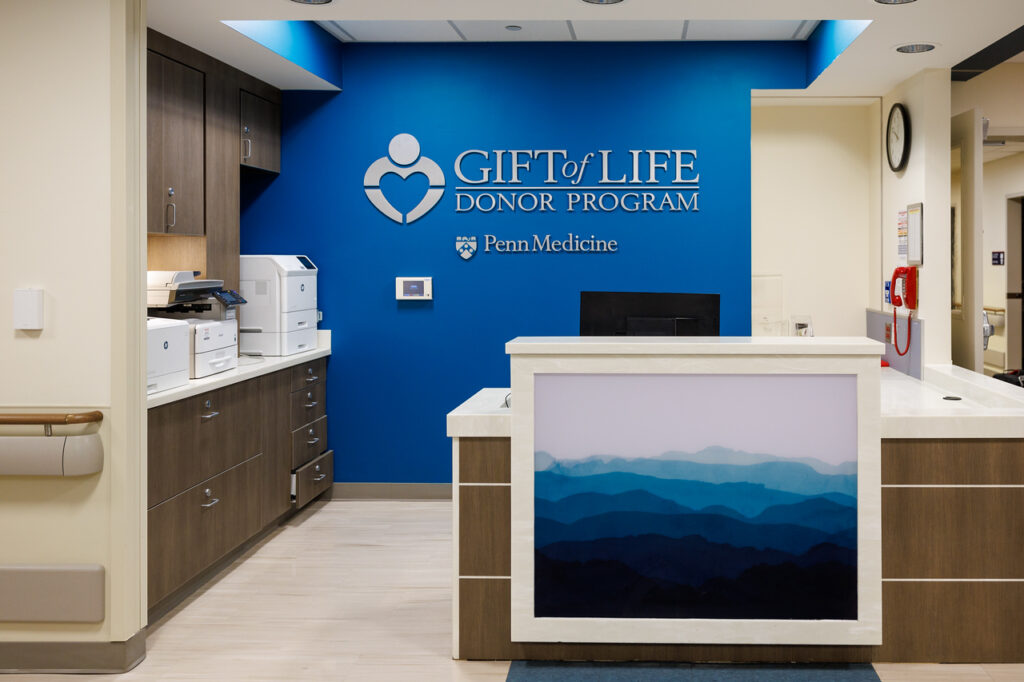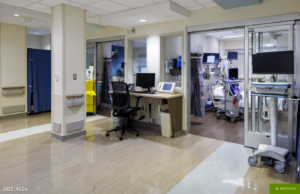
Philadelphia, Pa. (October 25, 2022) — Gift of Life Donor Program and Penn Medicine have opened the Gift of Life Donor Care Center at the Hospital of the University of Pennsylvania (HUP). As the first intensive care unit in the Northeast U.S. exclusively dedicated for deceased organ donors, the Center is staffed by top clinical experts with access to advanced medicine, tools, and technology that will maximize the impact of each donor’s life-saving gifts.
Located within HUP, the Donor Care Center will be open 24/7 365 days a year for deceased donors who meet specific clinical criteria, and with their family’s support, to be transferred from hospitals across Gift of Life’s region, which spans the eastern half of Pennsylvania, southern New Jersey, and Delaware. The Center is focused on the timely evaluation, allocation, and recovery of precious organs to increase opportunities for successful transplants. The specialized, first-of-its-kind space in this area also benefits the region’s health care systems, creating capacity specifically to help hospitals to best allocate ICU and OR spaces for patients.
“The Gift of Life region has been the most generous in the nation for organ donation every year since 2008. The opening of the Gift of Life Donor Care Center at the Hospital of the University of Pennsylvania honors that generosity by providing a space designed specifically to care for donor heroes and fulfill the powerful decision to save lives through organ donation,” said Rick Hasz, President and CEO of Gift of Life Donor Program. “The Donor Care Center marks a milestone in serving our community by creating a state-of-the-art donor-focused surgical facility as recommended by the National Academies of Science, Engineering and Medicine.”
The new 15,000-square-foot Donor Care Center features six private rooms, three operating rooms and an organ preservation laboratory, all equipped with advanced technology. It also includes dedicated private space for donor families. Gift of Life transplant coordinators, the nation’s leading donation professionals, work with the Center’s dedicated, highly skilled multidisciplinary critical care staff of physicians, nurses, nursing assistants, respiratory therapists, and pharmacists. Click here to view photos of the Donor Care Center.
Major advantages of the Donor Care Center include:
- Providing round-the-clock expert clinical donor management for timely interventions to increase the number of organs able to be transplanted
- Facilitating an expedient donation process that will support a family’s ability to proceed with arrangements to honor their loved one
- Providing dedicated donor space and resources to allow area hospitals to best utilize ICU beds, operating rooms, ventilators, and critical care staff to care for other seriously ill patients
“Penn has a long-standing commitment to the highest standards in donation and transplantation,” said Kim Olthoff, MD, Chief of Penn Medicine’s Division of Transplant Surgery. “We have always valued our partnership with Gift of Life to promote organ donation and to advance the field through innovative clinical programs and novel research. We are so proud to continue to expand our work with Gift of Life to create this new state-of-the-art facility. Together, we will facilitate even more donations to help those in need throughout our region and the country and honor every donor and their remarkable gifts.”

The Center’s centralization of specialized services represents an innovation in supporting organ donation in a region where the population is aging and is medically complex.
“The Donor Care Center is the result of more than two years of planning and collaboration as Gift of Life Donor Program, Penn Medicine and hospitals throughout our region continue to lead the way in innovation, best practices and clinical excellence,” said Christine Radolovic, Chief Clinical Officer of Gift of Life Donor Program. “With this unique and multidisciplinary team, we anticipate increasing the utilization of organs that might otherwise not be transplanted, saving lives and extending legacies for families of patients who become donors. With 20 waitlist patients dying each day nationally, each and every organ that can be made available for transplant represents a second chance at life.”
About 5,000 children and adults in the Gift of Life region and more than 100,000 nationwide are waiting for a life-saving transplant.
“Organ and tissue donation not only benefits transplant patients. It can bring peace to a donor’s family. My son, Sipho Themba, was an organ donor who saved six people,” said Cynthia London of Philadelphia, a volunteer ambassador and former board member of Gift of Life Donor Program. “At the Gift of Life Donor Care Center, donation gives comfort to grieving families as donors give life to others.”
Gift of Life Donor Program provides grief support and bereavement resources for donor families, along with numerous donor tribute and other programs. Learn more at donors1.org/families-of-donors/.
About Gift of Life Donor Program:
Gift of Life Donor Program is the non-profit, federally designated organ procurement organization, working with 129 acute care hospitals and 14 transplant centers to serve 11.3 million people in the eastern half of Pennsylvania, southern New Jersey, and Delaware. Thanks to its compassionate community, for the past 14 years, Gift of Life has coordinated the most organ donors in the United States. Its annual donation rate, most recently 62 organ donors-per-million-population, ranks among the highest in the world. Since 1974, Gift of Life has coordinated more than 55,000 organs for transplant, and more than two million tissue transplants have resulted from the generosity of donors and their families. One organ donor can save the lives of up to eight people, and a tissue donor can improve the lives of about 100 others. For more information or to register, visit donors1.org.
About Penn Medicine:
Penn Medicine is one of the world’s leading academic medical centers, dedicated to the related missions of medical education, biomedical research, and excellence in patient care. Penn Medicine consists of the Raymond and Ruth Perelman School of Medicine at the University of Pennsylvania (founded in 1765 as the nation’s first medical school) and the University of Pennsylvania Health System, which together form a $9.9 billion enterprise.
The Perelman School of Medicine has been ranked among the top medical schools in the United States for more than 20 years, according to U.S. News & World Report’s survey of research-oriented medical schools. The School is consistently among the nation’s top recipients of funding from the National Institutes of Health, with $546 million awarded in the 2021 fiscal year.
The University of Pennsylvania Health System’s patient care facilities include: the Hospital of the University of Pennsylvania and Penn Presbyterian Medical Center—which are recognized as one of the nation’s top “Honor Roll” hospitals by U.S. News & World Report—Chester County Hospital; Lancaster General Health; Penn Medicine Princeton Health; and Pennsylvania Hospital, the nation’s first hospital, founded in 1751. Additional facilities and enterprises include Good Shepherd Penn Partners, Penn Medicine at Home, Lancaster Behavioral Health Hospital, and Princeton House Behavioral Health, among others.
Penn Medicine is powered by a talented and dedicated workforce of more than 52,000 people. The organization also has alliances with top community health systems across both Southeastern Pennsylvania and Southern New Jersey, creating more options for patients no matter where they live.
Penn Medicine is committed to improving lives and health through a variety of community-based programs and activities. In fiscal year 2021, Penn Medicine provided more than $619 million to benefit our community.
